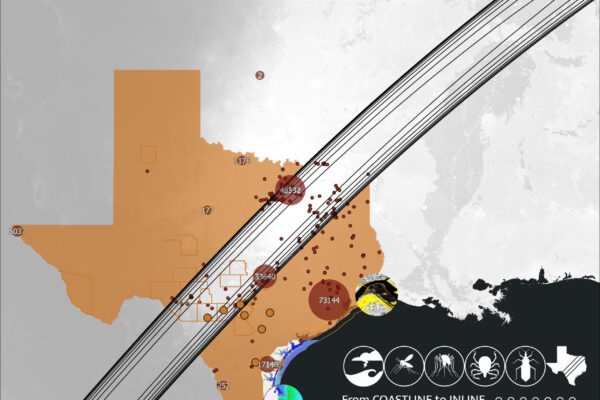For the April 8 total solar eclipse, the Oden Institute for Computational Engineering and Sciences will feature the installation “From COASTLINE to INLINE,” which integrates arts and technology at the intersection of climate change, flood and disease modeling.
The 3D installation will feature models and maps from the Texas coastline to the eclipse path of totality and will showcase modeling research aimed at understanding how climate change and extreme weather events influence the distribution of organisms that may cause emerging diseases. The visualization, open to the public, will be at the Texas Advanced Computing Center (TACC) Visualization Lab (VisLab) on the main campus, located on the main floor of the Peter O’Donnell, Jr. Building (POB) on April 8 from 10am – 4pm (closed from 1-2pm, during the eclipse).
Featured on a massive wall of interconnected screens using the National Ocean and Atmospheric Administration eclipse simulation path as the area of focus, the visualization highlights various sources of data (citizen science, fieldwork observations, and monitoring) that are used in this research.
Computational models are visualized to illustrate how flooding and climate can influence habitats for organisms that can spread emerging infectious diseases in Texas.
“The visualization features imagery of insects that become more prevalent further inland as a result of climate-related events, including the kissing bug, sand fly, lone star tick, and yellow fever mosquito, and a marine bacterial pathogen vibrio vulnificus,” explained Katherine Brown, a senior research fellow with the with the Computational Hydraulics Group at the Oden Institute. “These insects and pathogens bring a greater risk to humans who come in contact with them after a weather event, bringing the potential for more disease.”
“By emphasizing each of these insects and their location along the path of the solar eclipse we hope to bring attention to our research using visualization as an accessible tool for communicating,“ Brown said.
Maps, similar to those employed in this visualization, are used as predictive tools and help provide new insights about the potential spread of neglected tropical diseases beyond the tropics. A key focus of this work is to integrate various modeling approaches to understand the influence of climate-related events on the environment that can influence the distribution and proliferation of pathogenic organisms present in the soil and water.
In addition to Brown, the display will be piloted by Madison Russ and Juliet Whitsett. Russ is a member of the Computational Hydraulics Group, a research group within the Oden Institute led by Clint Dawson, professor and chair of the Department of Aerospace Engineering and Engineering Mechanics. The research group develops models and numerical methods to improve understanding of the mechanisms of flooding and storm surges.
A visualization specialist, Russ’s work is currently focused on producing visually informative flood, disease and integrated models with presentations that vary depending on the audience (scientists, policy makers and the public).
Whitsett is a local artist and a Planet Texas 2050 Art Fellow whose images and color-palettes have been used in community-based arts initiatives to inspire thoughtful reflection and action. Russ and Whitsett are creating the visualizations for this along with GIS mapping support from UT Libraries (Michael Shensky and Alex Marden).
“We are excited to provide education about impacts of climate change on ecosystems, human health, and the importance of community engagement in providing data and direction to the research so we can be prepared for the future. Humans have co-existed with many of these pathogens for centuries. Our goal is to help society be better prepared for what’s next,” said Brown.
The visualization installation is supported by Planet Texas 2050, The Wellcome Trust and the Oden Institute for Computational Engineering and Sciences. A QR code link to the Wellcome Trust-supported FloDisMod website will be provided at the installation.
Visit the Total Eclipse of the Horns website for more stories, resources and more.




